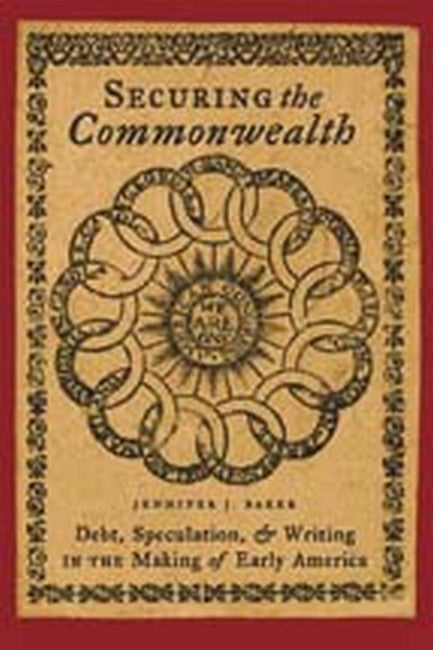Securing the Commonwealth examines how eighteenth-century American writers understood the highly speculative financial times in which they lived. Spanning a century of cultural and literary life, this study shows how the era's literature commonly depicted an American ethos of risk taking and borrowing as the peculiar product of New World daring and the exigencies of revolution and nation building. Some of the century's most important writers, including Cotton Mather, Benjamin Franklin, Royall Tyler, Charles Brockden Brown, and Judith Sargent Murray, believed that economic and social commonwealthand one's commitment to that commonwealthmight be grounded in indebtedness and financial insecurity. These writers believed a cash-poor colony or nation could not only advance itself through borrowing but also gain reputability each time it successfully paid off a loan. Equally important, they believed that debt could promote communality: precarious public credit structures could exact popular commitment; intricate financial networks could bind individuals to others and to their government; and indebtedness itself could evoke sympathy for the suffering of others. Close readings of their literary works reveal how these writers imagined that public life might be shaped by economic experience, and how they understood the public life of literature itself. Insecure times strengthened their conviction that writing could be publicly serviceable, persuading readers to invest in their government, in their fellow Americans, and in the idea of America itself.''Baker has written an incisive, provocative, sparkling book.''American Antiquarian Society''Baker brings a fresh and critical eye to works already well-known to specialists but probably unfamiliar to historians in general.''Journal of Interdisciplinary History''Astute and surprisingly lively volume . . . Highly recommended.''Choice''Historically astute study.''Philip Gould, Journal of the Early Republic''Baker makes a consistently intriguing case for the centrality of financial themes to the varied literary landscape of eighteenth-century Americadrawing poems, autobiography, essays, drama, and prose fiction into a broad, cultural conversation that focuses on the risks and the necessity for 'credit' in both the economic and the imaginative construction of the United States. No other book that I can think of presents eighteenth-century American writing in this stimulating and promising context.''Douglas Anderson, University of Georgia''The first work to trace the literary and, more broadly, cultural consequences of debt, speculation, and paper money in early America. The debates and metaphorics surrounding these issues made it the center for discussions of value, social contract, moral character, and textual representation. Baker takes this rich node of issues and powerfully demonstrates its centrality to an array of texts. An important book.''Jay Fliegelman, Stanford University''This is a work that attempts to break new ground. The topic is important but difficult and should be of great interest to historians, economists, and literary critics.''Max M. Edling, New England Quarterly''Astute and surprisingly lively volume . . . Highly recommended.''Choice''An incisive new study . . . Baker conceptualizes her readings in pathbreaking ways.''American Literature''Both a primer educating one into the financial thinking of early Anglo-America and a testament to the energy and creativity with which successive generations of provincials imagined commerce as a process of mediation.''Early American Literature

